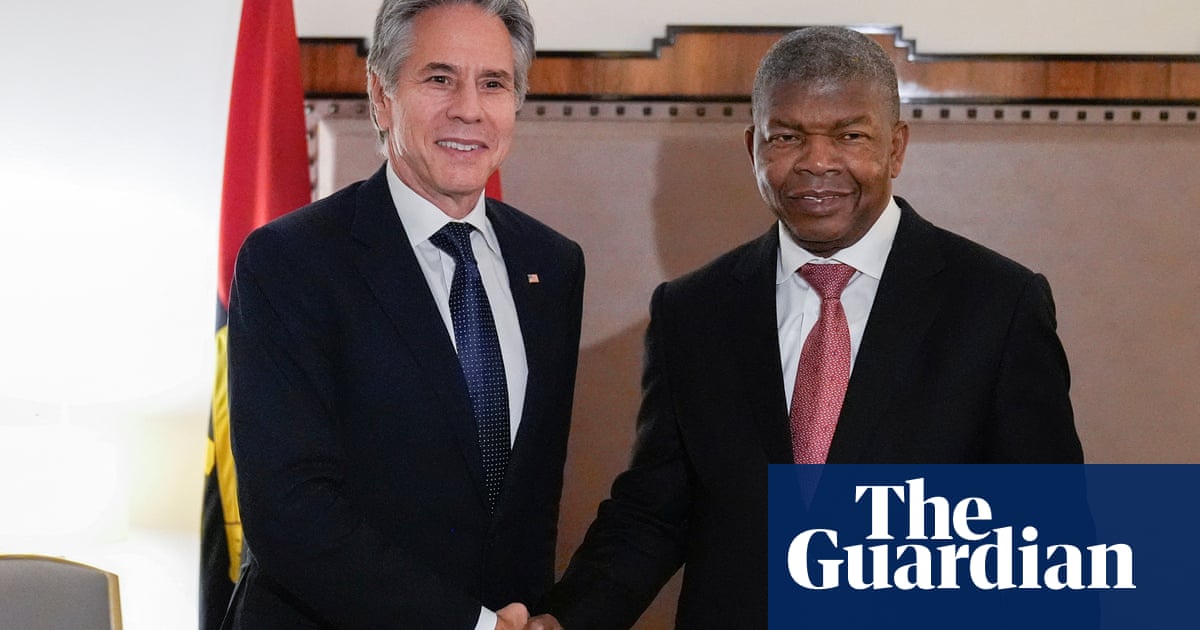
When Joe Biden travels to Angola on Sunday, it will be the first trip to an African country of his presidency and the first to the continent by a sitting US president since Barack Obama visited Kenya and Ethiopia in 2015.
It is a marker of how Africa’s 54 countries are increasingly courted by global powers, drawn to the continent by geopolitical shifts and an abundance of minerals needed for electric cars and other battery-powered technologies.
Biden will visit Angola from 13-15 October after three days in Germany, as his presidency draws to a close before the US election on 5 November. When Biden hosted his Angolan counterpart, João Lourenço, at the White House in November 2023, he said Africa was “critically important”, adding: “No country more important than Angola.”
The southern African country has historically been closer to Russia and, more recently, China.
The ruling People’s Movement for the Liberation of Angola (MPLA) party fought for independence from Portugal. After independence in 1975, Angola descended into civil war. The Soviet Union and Cuba intervened to support the MPLA, while the US and apartheid South Africa backed its opponents. More recently, Russia has been Angola’s main arms supplier.
Even before the Soviet Union collapsed, US oil companies including Chevron contributed the bulk of Angola’s budget, said Ricardo Soares de Oliveira, a politics professor at the University of Oxford.
“Angola … has had a rocky relationship with the United States for many years. Rocky means complicated, it doesn’t mean purely hostile,” said Soares de Oliveira.
Oil also lured China, whose banks had committed to lending $46bn to Angola since 2000, a quarter of all their African loan commitments, according to Boston University data.
With many infrastructure projects globally that were funded under China’s belt and road initiative having failed to deliver hoped-for returns, China’s focus has moved to smaller, greener investments and so-called “critical minerals”. The US, the EU, the United Arab Emirates and others are belatedly playing catch-up.
These minerals, which include copper and cobalt, are abundant in Angola’s landlocked neighbours Zambia and the Democratic Republic of the Congo.
The US and EU’s most high-profile play to secure supplies from Africa has been the Lobito Corridor. This includes refurbishing a railway that runs for about 1,000 miles (1,700km) from Kolwezi in DRC’s copperbelt to the Lobito port, which is also due to be upgraded.
There are plans to build a new line to Zambia and eventually to connect to infrastructure through Tanzania to the Indian Ocean. It is not clear if this involves partnering or competing with China, which pledged to upgrade the Tanzania-Zambia TAZARA railway that it financed in the 1970s.
The US’s Development Finance Corporation has put in $250m, with $4bn committed so far by all project partners, the US secretary of state, Antony Blinken, said at an event in New York in September.
“The US is desperate to catch up [with China] and this is one way,” said Paula Cristina Roque, who has written books on Angolan politics.
Angola’s peace-building role in conflict-riven DRC is also important to the US, as is countering many African countries turning away from the US amid Russia’s war with Ukraine and Israel’s bombardment of Gaza and Lebanon, said Roque.
“On the continent, Russia and China’s most strategic and important partner … which was Angola, now falls squarely in the US sphere of influence,” she said.
Judd Devermont, Biden’s former special assistant for Africa, rejected viewing US-Angola relations through a lens of competition with China.
“It is an inaccurate or at least incomplete framing,” said Devermont, now a partner at investment firm Kupanda Capital. “The importance of critical minerals is part of the equation but it doesn’t define US policy.”
“I think it is a matter of opportunity. President Lourenço, as far back his inauguration address, signalled an interest to work more closely with the United States and Europe.”
Lourenço, a Soviet-educated former general, had expressed a greater openness to foreign investment since taking office in 2017. But a failure to create jobs for a growing young population increased discontent.
Lourenço pivoted further towards the west after the 2022 national elections, which the opposition said it had won. Meanwhile, political activists have been arrested and repressive laws introduced.
For José Gama, an Angolan journalist living in South Africa, the US approach has been disappointing.
“We thought Biden would help Angola with human rights,” he said, recounting how hopes were raised when Biden committed to fighting authoritarianism in a 2021 speech soon after his inauguration.
As for what comes after Biden, his deputy, Kamala Harris, has not deviated significantly on foreign policy. In her acceptance of the Democrat presidential nomination, she said that she would ensure “that America, not China, wins the competition for the 21st century”. When visiting Ghana, Tanzania and Zambia last year, she emphasised the importance of the continent.
The Republican candidate, Donald Trump, has similarly had strong words for China. But it is not clear if the famously transactional former president would see the Lobito Corridor as a good deal if he won the 5 November election.
Meanwhile, the goal for African governments – including Angola’s – is to maximise returns from the increased interest in the continent.
“The Angolan aspiration is a very conventional one, which is to have as many partners [and] extract as much from these different relationships as possible,” said Soares de Oliveira. “They don’t want to choose.”
Source: theguardian.com

















